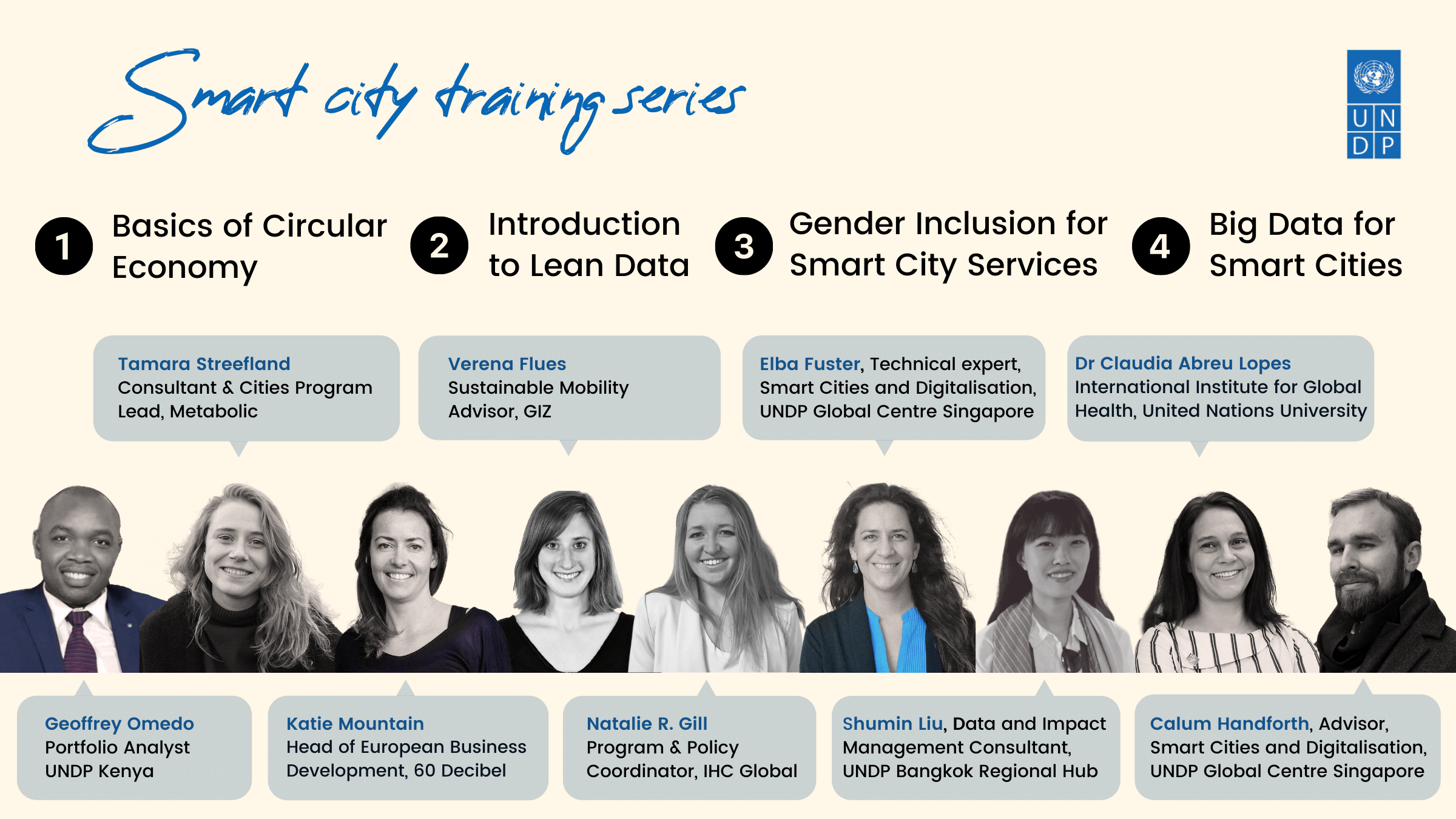Smart Cities Training Series

To help drive smart city and digitalisation expertise across UNDP, the Global Centre Singapore has been running Smart City Training Series available to UNDP Offices and external participants. Here are our previous training episodes:
1. Introduction to the Circular Economy for Smart Cities
We cannot understate the importance of a circular economy for the smart and sustainable cities of the future. The circular economy is a core concept in the sustainability agenda and contributes to the achievement of several Sustainable Development Goals. But what exactly is the circular economy, and how can we apply it in real life?
In this first webinar of the UNDP Global Centre Singapore Smart Cities training series, Tamara Streefland from the smart cities consultancy Metabolic introduced the concept of circular economies. She shared several insights on how circular practices can be promoted at a city level.
Geoffrey Omedo, Portfolio Analyst from the UNDP Country Office in Kenya, also explained their work on the promotion of the circular economy in the country.
2. Smart City Training Series: Introduction to #BigData for Smart Cities
Big Data is often discussed in the context of international development, but what exactly is Big Data? And how is it relevant to tackling issues in the urban environment – including in the context of smart cities?
As the urban population is expected to increase by an additional 2.5 billion people by 2050, what is the relevance of Big Data in making these areas liveable and sustainable? For our 2nd installment of our Smart City Training Series, we had a panel of experts who drew on their extensive experience in leading projects that use Big Data to improve lives and livelihoods.
3. Introduction to Lean Data
We hear a lot about ‘Big Data’, but this approach isn't always relevant when measuring the success of many international development initiatives. In particular, when working on digital and smart cities projects, ‘Lean Data’ principles can be especially useful.
Lean Data is about actionable social impact measurement. This includes leveraging tools like mobile-phone and voice-based customer data collection, and taking a ‘portfolio’ approach by learning from insights collected in other projects, programmes, and organisations. Katie Mountain, Business Development Manager at 60 Decibels, took us through the Lean Data process and principles that have been applied in many low- and middle-income countries.
This approach has not been deployed in UNDP, so Calum Handforth (Adviser, Digitalisation and Smart Cities) discussed a case study from an external project – focusing on chatbot deployment on Facebook Messenger.
4. How to Ensure Gender Inclusion for Smart City Services
Technology is not neutral. There is a growing gender digital divide, particularly in developing countries, that needs to be bridged for women to gain equal access to and ownership of digital tools and services - and to benefit from the opportunities for advancement that these innovations offer.
This webinar focused on how to deliver gender-inclusive smart city services. This includes the aspects or biases that need to be taken into consideration to provide equal levels of access to – and ownership of – technology, regardless of gender.
Natalie R. Gill, Program and Policy Coordinator at IHC Global, shared some of the risks and opportunities of using new technologies for the achievement of SDG5 and how we can design smart cities with women and girls in mind. Verena Flues, Sustainable Mobility Advisor at GIZ, the German international development agency, shared how a gender-based approach is crucial for mobility in cities – and how technology can play a key role in facilitating this. Joining them was our very own Elba Fuster Figuerola, Smart Cities and Digitalisation Expert at the UNDP Global Centre for Technology, Innovation, and Sustainable Development in Singapore.

 Locations
Locations